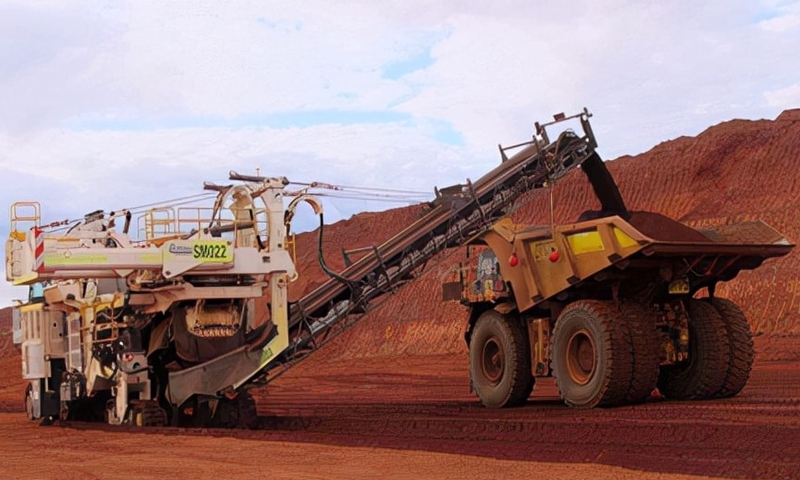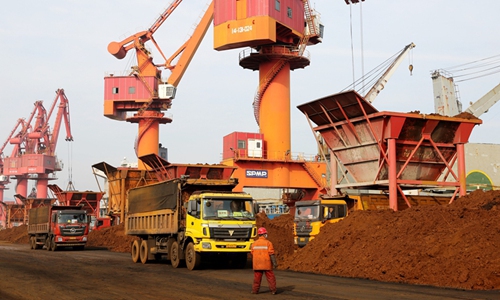Aussie iron ore exports expected to fall until Q1 of 2022 amid China’s control, supply diversification

An iron ore mining site in Australia Photo: cnsphotos
Industry insiders predict that while the price is likely to remain low until the first quarter of 2022, Australia's iron ore exports to China, its largest iron ore trading partner, may be slashed even further.
A source with the Anglo-Australian mining company Rio Tinto Group told the Global Times on Friday that while there is still demand from China, it has not been as good as the first half of the year.
China's duel control has contributed to the current situation, since the system is directly linked to the drop in steel production, which led to the weak demand for iron ore, the person said.
The spot price of imported iron ore in Shandong in East China, a major importer of iron ore, was dropped by 20-30 yuan ($3.13-4.69) per ton on Thursday from Wednesday.
The price drop ignited by weakened demand has made some major iron ore suppliers among the first to bear the brunt.
Despite the situation, Rio Tinto Group does not have customers for the Chinese market telling them not to ship goods or cancel orders at the moment, the source said, adding that they are shipping in accordance with long-term contracts.
China imported 91.61 million tons of iron ore and its concentrates in October, down 4.01 million tons from the previous month, a year-on-year decline of 14.2 percent, the General Administration of Customs said.
Industry insiders said that as the world looks toward carbon reduction, in which China is now taking the lead, iron ore imports will continue this weak trend, especially those from Australia, as China has been reducing its reliance on the country's supplies.
The main reason behind the drop is China's efforts toward the goal of zero carbon emissions for environmental protection purposes, Wang Guoqing, research director at the Beijing Lange Steel Information Research Center, told the Global Times on Friday. She expects China's crude steel production to continue to fall until the first quarter of next year.
"The carbon peaking plan for China's steel industry is expected to be introduced in December, which will make it clearer that capacity, output, and technology will be optimized," Wang said, noting that the proportion of China's monthly imports of Australian iron ore has also dropped significantly since the third quarter.
Driven by weak demand, the pressure on domestic port inventory accumulation has surged.
According to Mysteel's statistics on Friday, the weekly imported iron ore inventory of 45 ports across China was 151 million tons, an increase of around 1 million tons from the previous week. Among them, Australian iron ore dropped by 38.99 tons, while Brazil increased by 124.42 tons.
China is highly dependent on ore imports - and it is necessary to establish a diversified, multi-channel, and multi-method stable and reliable resource guarantee system to improve the domestic steel industrial chain and the ability to resist risks, China's central bank stressed in the third-quarter monetary policy implementation report on Friday.
"With China's vigorous efforts to buttress its concrete measures to tackle climate change, we are witnessing significant steps to optimize its industrial structure with a focus on environmental protection…steel mills have restricted production with consequent iron ore stockpiling, very few are considering increasing imports," Chen Hong, a professor and director of the Australian Studies Center at East China Normal University, told the Global Times on Friday.
While the Canberra government believes that Australia's iron ore is indispensable to China and even mulled putting restrictions on its exports to China, their speculative and irrational attempts to use the mineral as a coercive instrument to blackmail China have failed, Chen said.
"The drop in imports of Australian iron ore is expected to produce a foreseeable impact on the Australian economy," Chen said.

